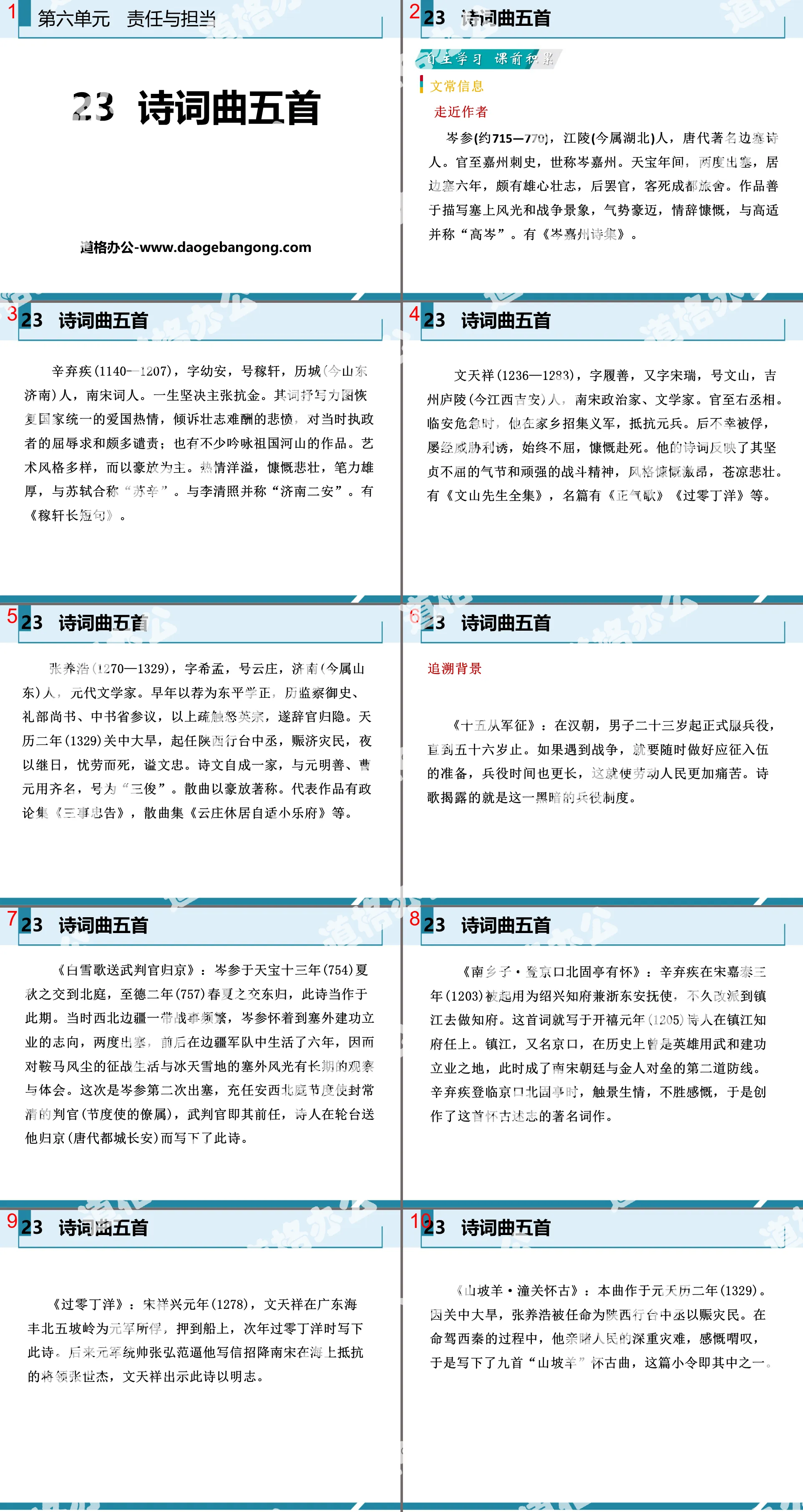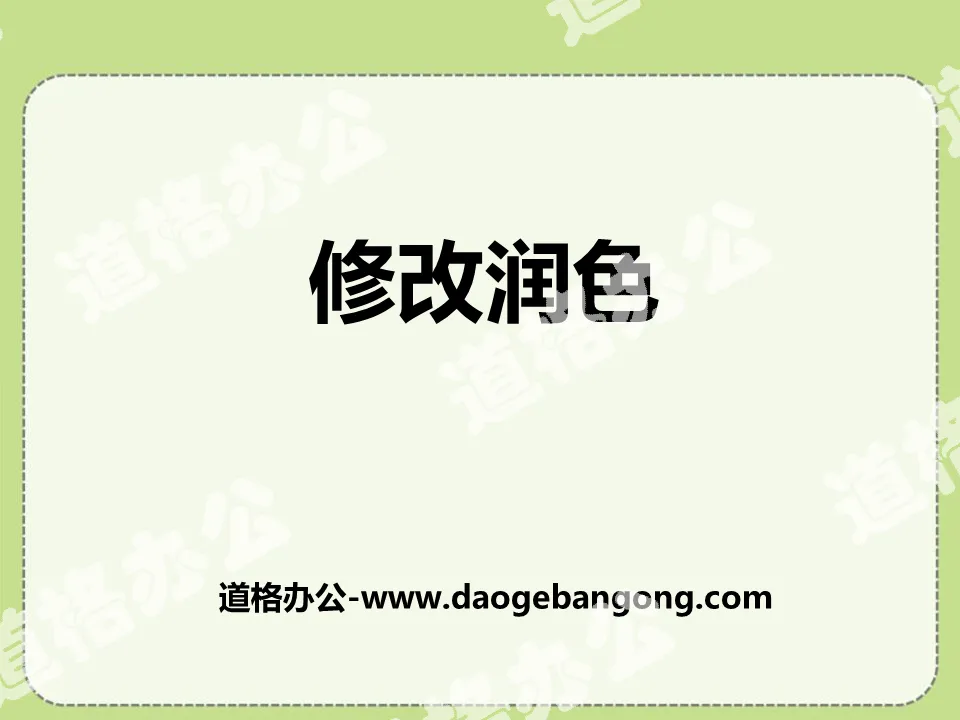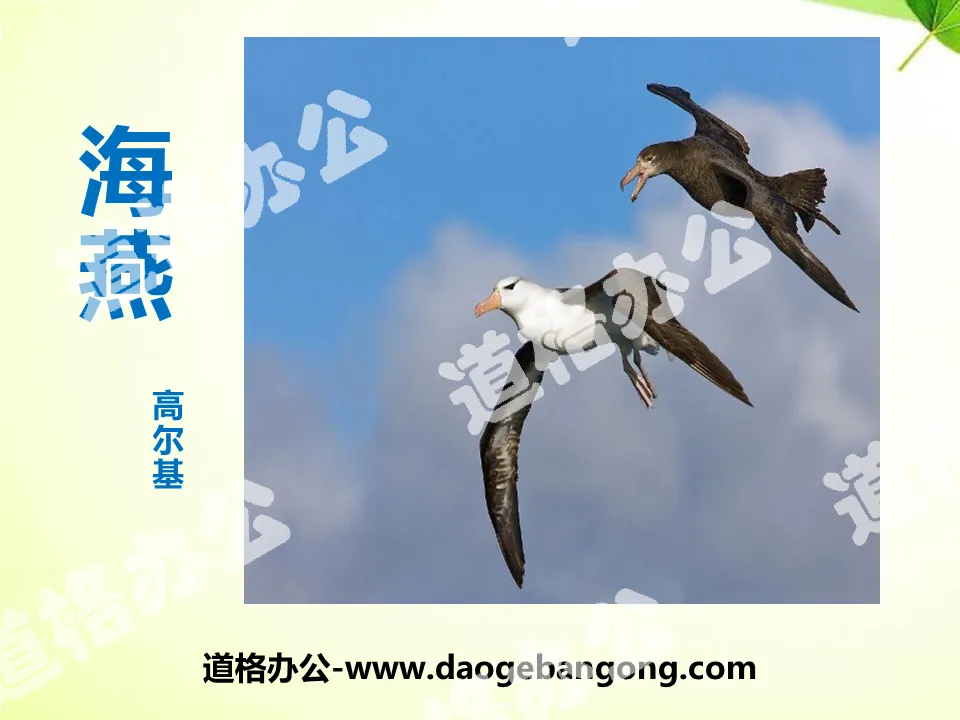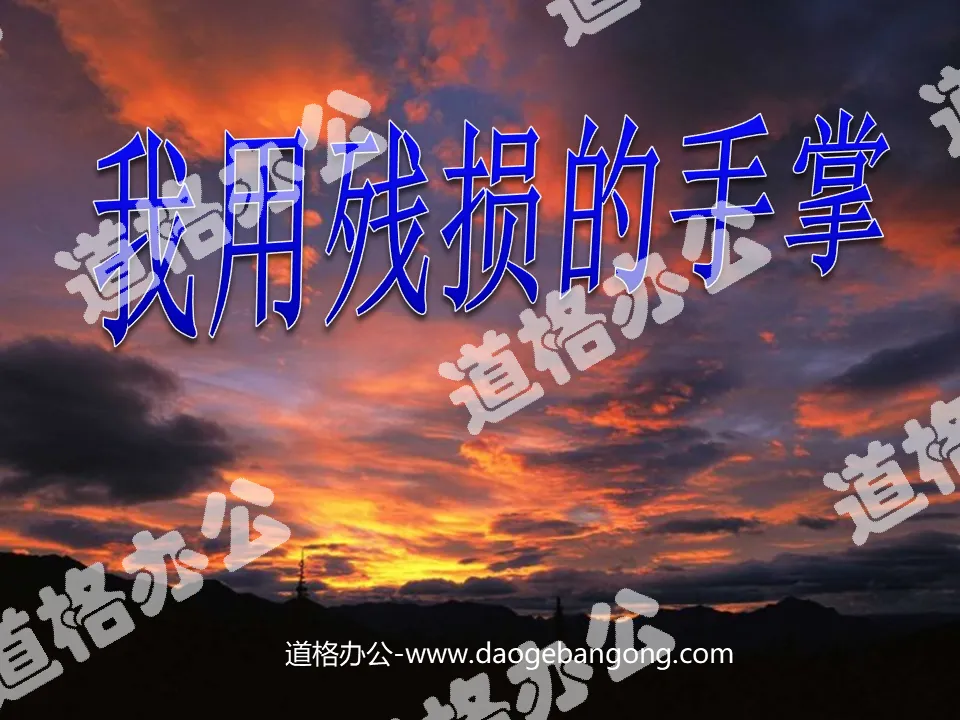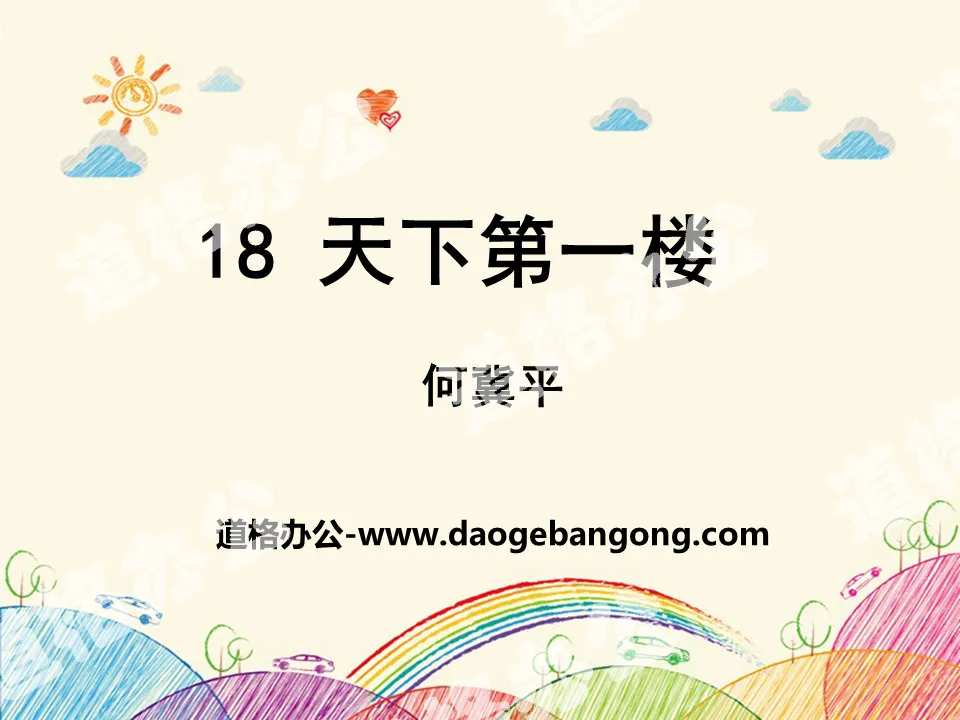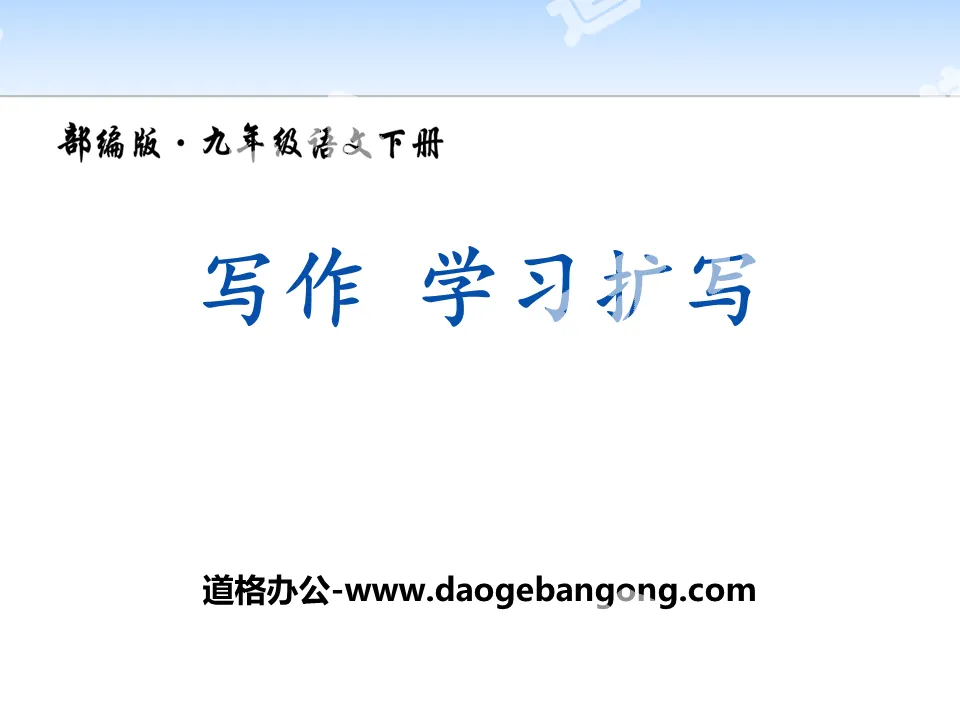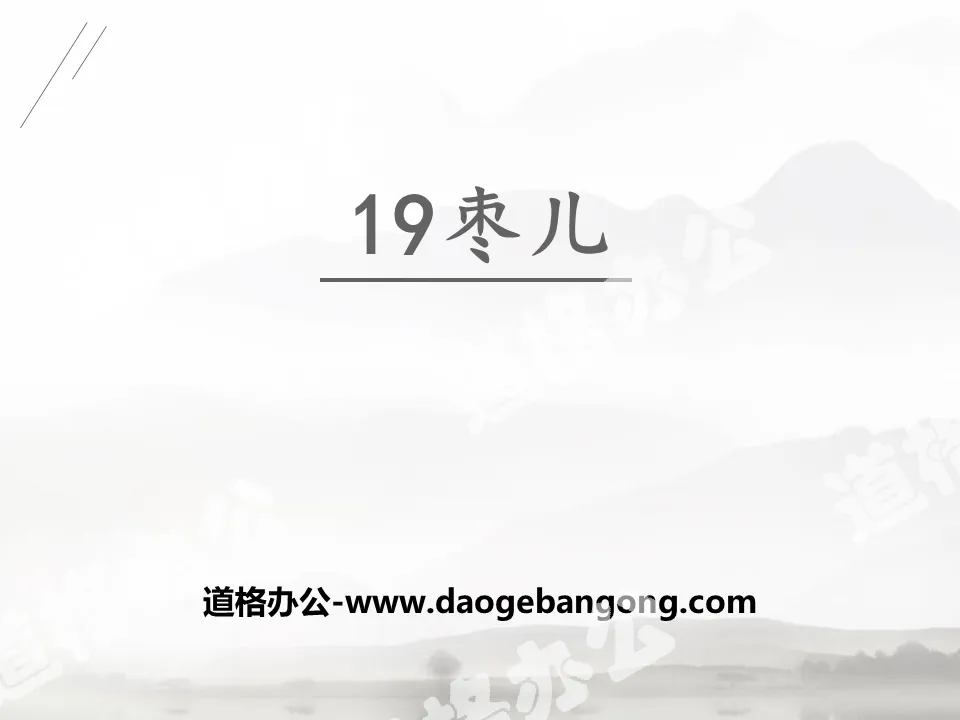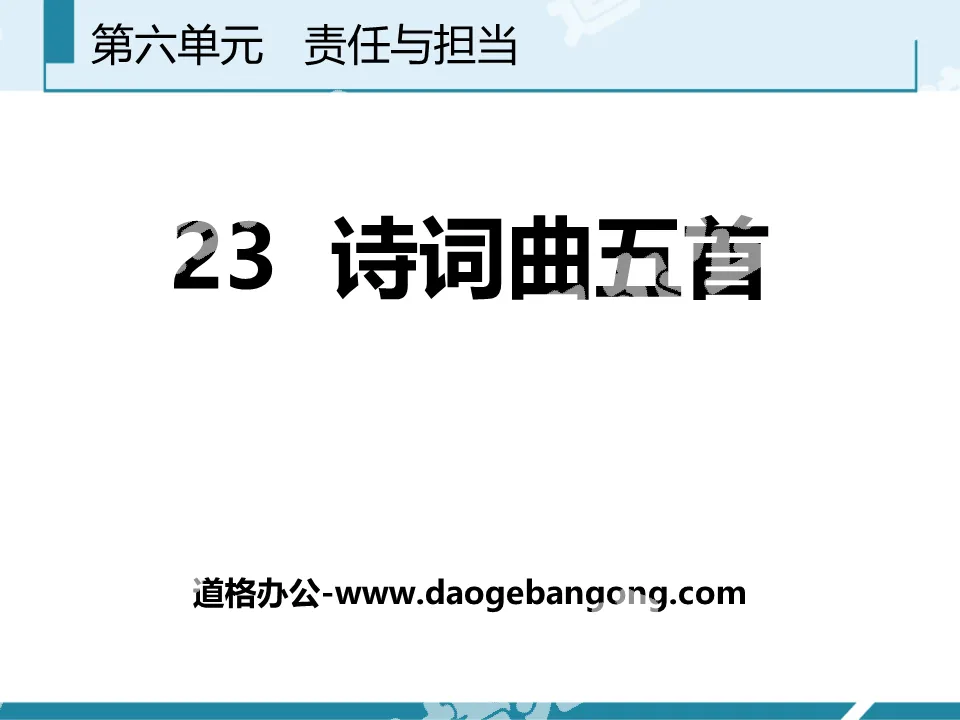
| Category | Format | Size |
|---|---|---|
| People's Education Press Ninth Grade Chinese Volume 2 | pptx | 6 MB |
Description
"Five Poems and Songs" PPT free courseware
The first part of the content: independent learning and accumulation before class
Get closer to the author
Cen Shen (about 715-770), a native of Jiangling (now part of Hubei), was a famous frontier poet in the Tang Dynasty. He became the governor of Jiazhou and was known as Cen Jiazhou in the world. During the Tianbao period, he went out to the frontier twice and lived in the frontier for six years. He was quite ambitious. He later resigned from office and died in a hotel in Chengdu. The work is good at describing the scenery of the fortress and war scenes, with heroic momentum and generous words. He is also known as "Gao Cen" together with Gao Shi. There is "Cen Jiazhou Poetry Collection".
Xin Qiji (1140-1207), courtesy name You'an and nickname Jiaxuan, was a native of Licheng (now Jinan, Shandong) and a poet in the Southern Song Dynasty. He firmly advocated resisting gold throughout his life. His poems express the patriotic enthusiasm of trying to restore the unity of the country, express the grief and indignation of unrealized aspirations, and condemn the humiliation of the then rulers for peace; there are also many works that praise the country's mountains and rivers. There are various artistic styles, but the main ones are bold and unrestrained. Enthusiastic, generous and tragic, with strong writing power, he and Su Shi are collectively known as "Su Xin". Together with Li Qingzhao, he is also known as "Jinan Er'an". There is "Jia Xuan Long Short Sentences".
Wen Tianxiang (1236-1283), also named Lushan, also named Songrui, and nicknamed Wenshan, was born in Luling, Jizhou (now Ji'an, Jiangxi), and was a statesman and writer in the Southern Song Dynasty. Official to right prime minister. When Lin'an was in danger, he recruited rebels in his hometown to resist Yuan soldiers. Later, he was unfortunately captured. Despite repeated threats and inducements, he remained unyielding and died generously. His poetry reflects his unyielding integrity and tenacious fighting spirit, and his style is impassioned, desolate and tragic. There is "The Complete Works of Mr. Wenshan", and famous works include "Song of Righteousness" and "Crossing the Lingding Ocean".
Zhang Yanghao (1270-1329), whose courtesy name was Ximeng and whose name was Yunzhuang, was born in Jinan (now Shandong) and was a writer of the Yuan Dynasty. In his early years, he was recommended as Dongping Xuezheng, and he supervised the censor, the minister of the Ministry of Rites, and the counselor of the Zhongshu Province. The above mentioned ministers angered the Yingzong, so he resigned and went into seclusion. In the second year of Tianli (1329), there was a severe drought in Guanzhong. He was appointed as the Prime Minister of Taichung in Shaanxi Province. He worked day and night to provide relief to the victims. He died of fatigue and was given the posthumous title Wenzhong. The poems and essays are in a family of their own, and are as famous as Yuan Mingshan and Cao Yuanyong, and are known as the "Three Heroes". Sanqu is famous for its boldness. His representative works include the collection of political commentaries "Three Advices on Matters" and the collection of Sanqu "Yunzhuang Residence in a Adaptable Small Yuefu", etc.
Tracing background
"Fifteen Military Expeditions": In the Han Dynasty, men formally served in the military from the age of twenty-three until they were fifty-six. If there is a war, one must be ready to be drafted into the army at any time, and military service lasts longer, which makes the working people even more miserable. What the poem exposes is this dark military service system.
"Baixue Ge Sends Magistrate Wu Back to the Capital": Cen Shen went to Beiting at the turn of summer and autumn in the thirteenth year of Tianbao (754), and returned eastward at the turn of spring and summer in the second year of De (757). This poem is considered to be of this period. At that time, there were frequent wars in the northwest frontier area. Cen Shen, with the ambition to make contributions outside the Great Wall, went out to the Great Wall twice and lived in the frontier army for six years. As a result, he had a long-term observation and experience of the war life of pommel horse and the ice and snow scenery outside the Great Wall. This was the second time that Cen Shen went out to the fortress and served as the judge of Feng Changqing, the Jiedu envoy of Anbei. wrote this poem.
"Nanxiangzi·Dengjingkou Beiguting Youhuai": Xin Qiji was appointed as the prefect of Shaoxing and the pacifier of eastern Zhejiang in the third year of Jiatai of the Song Dynasty (1203), and was soon transferred to Zhenjiang to be the prefect. This poem was written in the first year of Kaixi (1205) when the poet took office as the prefect of Zhenjiang. Zhenjiang, also known as Jingkou, was a place where heroes used military force and made achievements in history. At this time, it became the second line of defense between the Southern Song Dynasty court and the Jin people. When Xin Qiji came to Beigu Pavilion in Jingkou, he was moved by the scene and was filled with emotion, so he composed this famous poem about nostalgia for the past.
"Crossing the Lingding Ocean": In the first year of Song Xiangxing (1278), Wen Tianxiang was captured by the Yuan army in Wupoling, north of Haifeng, Guangdong, and was taken to a ship. He wrote this poem when he crossed the Lingding Ocean the following year. Later, the Yuan army commander Zhang Hongfan forced him to write a letter to recruit Zhang Shijie, a general who was resisting at sea in the Southern Song Dynasty. Wen Tianxiang showed this poem to clarify his ambition.
"Shanshan Sheep·Tong Guan Gu": This song was composed in the second year of Tianli in the Yuan Dynasty (1329). Due to the severe drought in Guanzhong, Zhang Yanghao was appointed as the Prime Minister of Taichung, Shaanxi Province to provide relief to the victims. In the process of driving to the Western Qin Dynasty, he witnessed the people's severe disasters and sighed with emotion, so he wrote nine nostalgic songs of "Sheep on the Hillside", and this little order is one of them.
Basic accumulation
1. [Read the correct pronunciation] Add punctuation to the following.
2. [Distinguish the glyphs] Write Chinese characters according to pinyin.
yuán()门 干gē() Gongquè()
peak luán () hàn () sea huáng () fear
3. [Grasp the Rhythm] Give the following sentences the correct reading rhythm.
(1) The general’s horns and bow cannot be controlled, and the armor of the general is too cold to wear.
(2) Sadness. Wherever the Qin and Han Dynasties passed, thousands of palaces and palaces were made of earth.
[ Answer
(2) Sad/Qin and Han Dynasty/where the meditators walked, the palace/ten thousand rooms/all/were made of earth
Five poems, lyrics and music PPT, part 2 content: cooperative exploration and classroom interaction
Cooperation and exchange
6. What is the structural role of the two sentences "The vast sea is covered with hundreds of feet of ice, and the gloomy clouds condense thousands of miles away" in "Baixuege Sends Magistrate Wu Back to the Capital"? Please analyze it based on the content of the poem.
[ Analysis Here, "The vast sea is covered with hundreds of feet of ice" describes the scene of a world of ice and snow on the frontier fortress, which summarizes the above description of the scenery of the frontier fortress; "Gloomy clouds condense thousands of miles away" creates a cloudy scene, which leads to the lyricism below. To sum up, the sentences here serve as a link between the previous and the following.
[Answer] This sentence plays a role in connecting the previous and the following in structure. The first sentence "The vast sea is covered with hundreds of feet of ice" depicts the picture of hundreds of feet of ice crisscrossing the desert, and summarizes the strange cold scene of the ice and snow above; the second sentence "Gloomy clouds are bleak and condensed thousands of miles away" writes that the sky is full of ice. The bleak and cloudy scene evokes the poet's worry about his friend's long journey, which naturally leads to the farewell below.
7. There are two sentences in "Shanshan Sheep·Tong Caring about the Ancient Times": "I am sad that where the Qin and Han Dynasties traveled, all the palaces and palaces were turned into dirt". Combined with the content of the whole song, let's talk about whether the poet was sad because "all the palaces and palaces were turned into dirt" .
[The answer]No. From "Prosperity, the people suffer; death, the people suffer" we can see that the poet is sad for the people throughout the ages, expressing the poet's sympathy for the people and his resentment towards the feudal rulers.
Classic lectures and exercises
Read the following sentence and answer the questions.
Nanxiangzi·Dengjingkou Beiguting is pregnant
[Song] Xin Qiji
Where can I see China? Beigu Tower is full of scenery. How many things have happened through the ages? long. The Yangtze River is endless.
When he was young, he had ten thousand pockets of horses, and the war in the southeast has not ended. Who is the rival of the world's heroes? Cao Liu. Having a son should be like Sun Zhongmou.
8. What is the implication of the first two sentences of the poem, "Where can I see China? Beigu Tower is full of scenery." What role does it play in the structure?
[Answer] What these two sentences want to express is, looking from afar, where is our homeland in the Central Plains? All that can be seen is the beautiful scenery around Beigu Tower. The poet looked eagerly at the area occupied by the Jin soldiers in the north of the Yangtze River, and felt that the scenery was different and the mountains and rivers had changed. The implication is that the Central Plains is no longer owned by our country! So standing on the Beigu Tower, the poet couldn't help but feel the rise and fall of the ages, which naturally led to the following.
9. In the first half of the second film, what is the purpose of the poet praising Sun Quan?
[ Answer Passionately praising Sun Quan for not fearing powerful enemies, resolutely resisting, and winning the battle, which just reflects the mediocrity, cowardice, and complacency of the civil and military people in the Southern Song Dynasty.
Test focus
The role of allusions in poetry
Interpretation of test points: Analyzing the role of allusions in poetry is to explain the allusions used in poetry, explain their origins, and analyze their functions. Common question types include: What allusions are used in this poem (ci)? What does this allusion mean? What kind of expression effect does it have?
Ideas for answering the question: First, understand the original meaning of the allusion used. This is the basis for answering the question. Then, combined with the context and the author's life experience, understand the hidden meaning in the allusion. This is the key to solving the problem. For example, in Su Shi's "Jiangchengzi·Hunting in Mizhou", "Chijie Yunzhong, when will Feng Tang be sent", which uses the allusion of the Western Han Dynasty that Emperor Wen of the Western Han Dynasty sent Feng Tang Chijie to pardon Wei Shang, the prefect of Yunzhong. It can be seen from the whole poem that Su Shi is eager to show his ambition, kill enemies, serve the country, and make contributions. But at that time, he was sent to Mizhou and was not reused by the emperor. How much he longed for the court to re-appoint him just like Emperor Wen of Han Dynasty sent Feng Tang to pardon Wei Shang. It was not convenient for him to express this meaning clearly, so he quoted allusions and compared himself with the ancients, implicitly expressing his hope to be reused by the court and make contributions.
Five poems, lyrics and music PPT, the third part: summary
Writing features
"Fifteenth Military Expedition": lyrical on the spot, simple language
On the way home → On the way home → Back home → "Go out and look eastward". The emotional changes are as follows: eager to go home → disappointed in hope → completely disappointed → sad and tearful, feeling at a loss. These all come down to the theme of poetry that exposes the dark social reality. The whole poem uses line drawing techniques to depict scenes and people, with clear layers and simple language. It also uses sad scenes to describe sorrow, which is sincere and unique. It also embodies the artistic characteristics of the lyrical scene of Han Dynasty Yuefu.
"Bai Xue Ge Sends Judge Wu Back to the Capital": Beautiful and novel, with ups and downs.
The poet accurately grasped the characteristics of the frontier fortress scenery and wrote about its peculiarities; moreover, the poet was rich in imagination and good at using romantic techniques to express subjective experience and association, making the description of the scenery extremely varied. At the same time, poets are good at using different techniques to describe scenes and express emotions from different angles. Sometimes it is real writing, sometimes it is fictitious writing, sometimes it is bold and sometimes it is meticulously carved. First use metaphors to describe the snow scene in the morning, then use contrast and exaggeration to describe the snowy sky and snow, and finally use contrast and contrast to describe the snow at dusk. From the trees in the snow, the people in the snow, the world in the snow, to the military camps in the snow, the red flags in the snow, and the Tianshan Mountains in the snow, the beautiful images of nature and the poet's rich emotions are reproduced. The whole poem is like a heroic song on the frontier, sometimes fast and sometimes slow, with cadences and ups and downs, a balance of hardness and softness. This is a reflection of the spirit of the prosperous Tang Dynasty.
"Nanxiangzi·Dengjingkou Beigu Pavilion is pregnant": bright style, optimistic and high-spirited
The entire poem is a close combination of scene description, lyricism, and discussion; it integrates the language of ancient people into the lyrics, and makes full use of allusions; there are three questions and three answers throughout the text, which are clearly layered and echo each other; it expresses emotions in the scene, and uses the past to satirize the present; the style is bright, the spirit is broad, and the mood is optimistic and high-spirited .
"Crossing the Lingding Ocean": concise language and generous style
The language of this poem is concise. The poet selected several key fragments in his life, reviewed his life experience and experiences, highly summarized his personal life experiences and the national situation, and expressed his impassioned, loyal and noble character and fearless heroism. The poetry is generous in style and blends heroic emotions into the poem, aiming to inspire future generations to have a strong and unyielding will. In particular, the neck couplet cleverly uses homophony to express the poet's fearful and lonely difficult situation. The last couplet is an inspiring song for the ages, and it has inspired many people with lofty ideals in later generations.
"Shanshan Sheep·Tong Guan Gu": broad realm and sincere feelings (★★★)
This small order expresses such a historical theme by paying tribute to ancient monuments: in the long feudal society, no matter how the dynasties changed, the people still lived a painful life. It expresses the poet's deep sympathy for the sufferings of the people and his ruthless lashing of the feudal rulers of the past dynasties. The whole novel has a broad realm, sincere emotions, and strong artistic appeal.
Five poems, lyrics and music PPT, the fourth part: summary of the main theme
"Fifteenth Military Expedition"
By describing the protagonist's experience, this poem reveals the suffering caused by the feudal military service system to the working people, and also reflects the people's disgust and hatred for war.
"Bai Xuege Sends Judge Wu Back to the Capital"
This poem describes the beautiful scenery of August snow in the northwest frontier, and expresses the poet's attachment to his friend and his melancholy when his friend returns to Beijing.
"Nanxiangzi·Dengjingkou Beiguting Pavilion has feelings"
By praising ancient heroes, this poem expresses the poet's heroic feelings of eager to serve the country like the ancient heroes. It is full of strong patriotism, but it also reveals that the poet has no way to serve the country. The infinite emotion contains the resentment towards the peaceful Southern Song Dynasty court.
"Crossing the Lingding Ocean"
In this poem, the poet recalled the experience of resisting the Yuan Dynasty, and used poetry to clarify his ambition, showing his high integrity and awe-inspiring heroic spirit as he regarded death as home.
"Shanshan Sheep·Tong Caring About Ancient Times"
In this poem, the poet looks back on the present and recalls the past, thinking about the rise and fall of the dynasties and the suffering of the people. He sharply points out the opposition between the feudal rulers and the people, and expresses the poet's thinking about history and his sympathy for the people.
Keywords: Free download of Chinese PPT courseware for the second volume of the ninth grade of the Ministry of Education Edition, five poems and songs PPT download, fifteenth military expedition PPT download, Bai Xuege sent Judge Wu back to Beijing PPT download, Nanxiangzi Dengkou Beiguting Youhuai PPT download, Crossing Ling Ding Yang PPT download, Shanshan Yangtong care about ancient PPT download, .PPT format;
For more information about the PPT courseware of "Crossing Ling Ding Yang Nan Xiang Zi Deng Bei Gu Pavilion at the entrance of Jing, Bai Xue Ge sent off Judge Wu to return to Beijing on the 15th day of his military expedition and Yangtong's caring ancient poems on the hillside" PPT courseware, please click Guo Ling Ding Yang ppt Nan Xiangzi Deng Jingkou Beigu Pavilion is pregnant ppt Bai Xuege sends Judge Wu back to the capital ppt Fifteenth Army Conquest ppt Hillside Yangtong cares about ancient ppt poems, lyrics and music Five ppt tags.
"Bai Xuege Sends Judge Wu Back to Beijing" PPT Free Courseware:
Free PPT courseware of "Baixuege Sends Magistrate Wu Back to Beijing" Part One: Learning Objectives 1. Read the poems aloud and understand the characteristics of the poets and frontier fortress poems. 2. Appreciate the unique beauty of pictures and language in poetry. 3. Understand the poet's emotions and learn his optimistic and heroic spirit. ..
"Bai Xuege Sends Judge Wu Back to Beijing" PPT teaching courseware:
The first part of the PPT teaching courseware "Baixuege Sends Magistrate Wu Back to Beijing": The scene is introduced during the Tianbao period of the Tang Dynasty. There were constant wars between the Li Tang Dynasty and the northwest ethnic minorities on the border. Many literati also joined the military shogunate to seek personal development and experience the frontier fortress. The intense military...
"Fifteenth Military Expedition" PPT teaching courseware:
"Fifteenth Military Expedition" PPT teaching courseware Part One: Learning Objectives 1. Understand the literary common sense of Yuefu poems and master the content of the poems. 2. Understand the emotions expressed in poetry. 3. Understand the cruelty of the ancient military service system, feel the suffering that war brings to people's lives, and cultivate...
File Info
Update Time: 2024-06-30
This template belongs to Chinese courseware People's Education Press Ninth Grade Chinese Volume 2 industry PPT template
"Five Poems and Songs" PPT free courseware Simple campus recruitment activity planning plan summary enterprise and institution recruitment publicity lecture PPT template is a general PPT template for business post competition provided by the manuscript PPT, simple campus recruitment activity planning plan summary enterprise and institution recruitment promotion Lecture PPT template, you can edit and modify the text and pictures in the source file by downloading the source file. If you want more exquisite business PPT templates, you can come to grid resource. Doug resource PPT, massive PPT template slide material download, we only make high-quality PPT templates!
Tips: If you open the template and feel that it is not suitable for all your needs, you can search for related content "Five Poems and Songs" PPT free courseware is enough.
How to use the Windows system template
Directly decompress the file and use it with office or wps
How to use the Mac system template
Directly decompress the file and use it Office or wps can be used
Related reading
For more detailed PPT-related tutorials and font tutorials, you can view: Click to see
How to create a high-quality technological sense PPT? 4 ways to share the bottom of the box
Notice
Do not download in WeChat, Zhihu, QQ, built-in browsers, please use mobile browsers to download! If you are a mobile phone user, please download it on your computer!
1. The manuscript PPT is only for study and reference, please delete it 24 hours after downloading.
2. If the resource involves your legitimate rights and interests, delete it immediately.
3. Contact information: service@daogebangong.com
"Five Poems and Songs" PPT free courseware, due to usage restrictions, it is only for personal study and reference use. For commercial use, please go to the relevant official website for authorization.
(Personal non-commercial use refers to the use of this font to complete the display of personal works, including but not limited to the design of personal papers, resumes, etc.)
Preview
